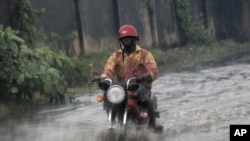Heavy rains and flooding in Nigeria have killed at least 20 people in the commercial capital Lagos where the governor has ordered the immediate demolition of buildings illegally constructed on drainage canals.
Heavy rains this week drove thousands of people from their homes in Lagos, with foam mattresses floating out front doors and livestock washed away by flash floods.
The National Emergency Management Agency says at least 20 people died in what it calls the most devastating floods so far this year.
On an inspection tour of the damage, Lagos State governor Babatunde Fashola said there are too many people living too close to drainage canals, putting up buildings without permission that block the flow of rainwater.
“People are building too close, without approval, to our drainage areas," said Fashola. "But once it drains, the drains are working and that is why you see the water is going after the rain has subsided.”
State building inspectors are already marking for demolition homes that were built illegally along the canals as well as legally-constructed buildings whose foundations have been undermined by flooding.
Fashola says the state will waste no time in pulling down those structures to reduce the risk of further flooding as the rainy season has only just begun. He told people living in marked buildings to leave immediately.
“You are staying right on the canal," added Fashola. "You can see the water can't you? So you have to clear out of this place. Leave your market. You can do your business, alright? But you can't live here.”
The governor is promising to help people find other places to live. But that is a tall order in an already-jammed city of 15 million people, much of which lies at least two meters below sea level. Fashola says he sympathizes with people who are angry about being forced out of their homes but says he must protect life over property.
“We have told our law enforcement people now there will be no tolerance for people close to the drain," he said. "We can't afford it any more. We can't put people's lives at risk.”
A top official in the office of drainage at the ministry of environment, Muyideen Akinsanya, says trash and silt in some drainage channels have cut their carrying capacity by half.
“These channels, you can see, are highly silted. And that is why we are having a lot of the backwater problem that we have been having," said Akinsanya. "We don't have problems downstream. It goes as far back downstream as four kilometers before discharging.”
Rains are expected to continue this week and will likely carry on through September. Flooding in the northern city of Katsina has killed nine people. In areas with open sewers, heavy rains regularly contaminate drinking water and lead to cases of cholera.
